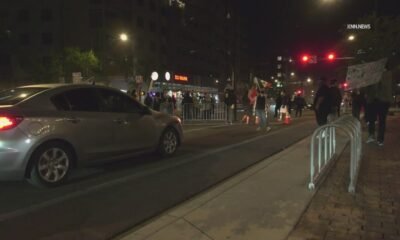cct-tracking
Massive Blackout in Spain and Portugal Strands Thousands and Darkens Millions of Homes

On Monday, a massive outage plunged Spain and Portugal into darkness, disrupting daily life and stranding countless passengers. The blackout culminated in significant challenges, including the loss of phone and internet services across the Iberian Peninsula.
Prime Minister Pedro Sánchez announced that nearly 11 hours after the outage began, officials were still investigating the cause of the grid failure. “We have never had a complete collapse of the system,” he stated, noting that at 12:33 p.m., Spain’s power grid lost a staggering 15 gigawatts, accounting for 60% of its national demand, within mere seconds.
Red Eléctrica’s operations chief, Eduardo Prieto, described the outage as both “exceptional and extraordinary.” By 5 a.m. Tuesday, power had been restored to over 92% of affected areas, with Sánchez assuring the nation that full power would return by day’s end.
This incident marks the second significant power failure in Europe within a month, following a fire shutdown at Heathrow Airport in March. As concerns grow over potential sabotage, the Portuguese National Cybersecurity Center ruled out the possibility of a cyber attack, as did officials in Brussels.
Traffic came to a halt in both Madrid and Lisbon as businesses closed. Emergency services were called to assist approximately 35,000 passengers stranded on over 100 halted trains. By late evening, some remained stuck, with workers aiding in their evacuation.
In Madrid, frustrated travelers at the bus stop resorted to hitchhiking as buses ran infrequently or were overcrowded. “I’ve been here for almost three hours, trying to get someone to take me to the airport,” expressed traveler Jessica Fernández, highlighting the chaos.
The subway systems also ceased operation, leaving many unsure how to return home. Hospitals transitioned to generator power, while gas stations and most mobile networks became inoperative, forcing residents to seek alternative means of communication.
With a combined population of around 60 million, such widespread outages are rare in the Iberian region. The Canary Islands, Balearic Islands, and territories of Ceuta and Melilla remained unaffected. An emergency meeting of the National Security Council convened as Sánchez announced that military resources would be deployed to supply generators to the hardest-hit areas on Tuesday.
In Portugal, Prime Minister Luis Montenegro confirmed that discussions with Sánchez were ongoing and expressed optimism about restoring power swiftly. Reports indicated that the root cause of the issue was linked to external complications.
Power restoration efforts involved drawing electricity from Morocco and France, paired with increased production from Spain’s hydroelectric and thermal plants. As the outage unfolded, Spanish airports operated on backup systems, leading to delays and uncertainty for travelers.
Some took the opportunity to enjoy the outdoors despite the chaos, with people gathering in parks and restaurants. “We are lucky. Some people got trapped in the metro. And there is a positive side: We are talking more with each other,” remarked a Barcelona resident, expressing a silver lining amid the crisis.
As time passed, anxiety grew for those unable to connect with loved ones. In Terrassa, generator stores quickly sold out, highlighting the demand for backup solutions. Portugal’s emergency services remained on high alert, responding to numerous requests for assistance, including those trapped in elevators.


















